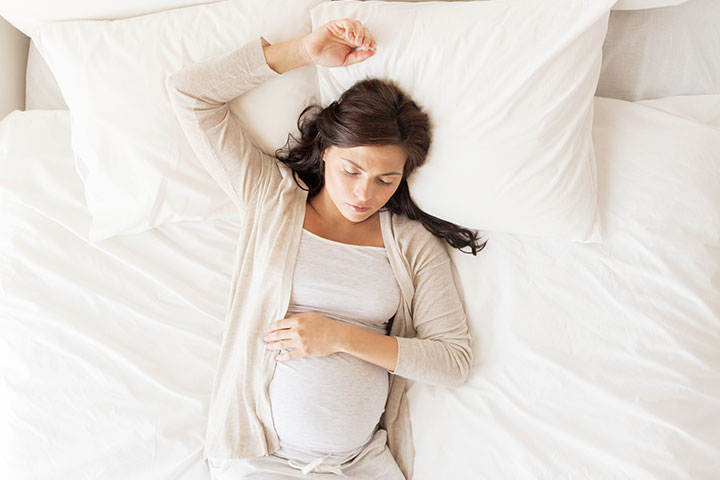
Image: Shutterstock
Pregnancy is no easy feat. Moms-to-be share a lot of excitement as well as stress when carrying a life inside their belly. It’s surely overwhelming, especially with a pile of dos and don’ts to follow. While the initial months do allow pregnant women to catch up on some precious sleep, it becomes difficult as the months go by and they move closer to the due date.
The most common issues that affect women during pregnancy are leg cramps, the growing belly size, heartburn, and constipation, to name a few (1). Despite the discomfort, it is essential for expecting moms to get a fair amount of sleep for their own wellbeing and that of the baby (2).
Pregnancy entails that you take extra care since there’s a little one inside dependent on you. And this is why you’ll often hear people advising you to sleep while you can. Though most women prefer sleeping on their backs, it’s strictly prohibited when in the family way. But why is resting on the back or stomach considered bad? As it turns out, some good medical reasons support the claim. If this got you curious, read on to learn more:
Why Should Pregnant Women Sleep On The Left Side?
Image: Shutterstock
Sleeping on the left side is often considered the “ideal” position during pregnancy. With time, It is difficult for the moms-to-be to manage the pain of the growing fetus kicking her intestines or bladder (3). But it’s not simply for comfort that doctors support the reason behind sleeping on the left side.
According to the American Pregnancy Association (APA), Sleep On Side (SOS) is the best sleep position when pregnant. This is because it places the least amount of pressure on the veins and internal organs. Also, an optimal blood flow from the Inferior Vena Cava (IVC) is possible when a pregnant woman positions herself to the left side during sleep. Compression of mom’s vital organs is bad because this could result in a drop in blood pressure, reduction in cardiac output, and resultant breathing complications. The reduced blood flow that’s associated with laying flat on the back can magnify into unresolvable complications later (4).
Several studies confirm that sleeping on the back during pregnancy is associated with a greater risk of stillbirth (5). Another study reports that pregnant women who had a stillbirth within 28 weeks of gestation were more likely to have slept on their backs before the stillbirth than those continuing with a healthy pregnancy. Such alarming trends provide enough evidence for doctors to recommend that pregnant women stick to sleeping on the side, especially the left (6), (7).
When you sleep on the left side, it increases the amount of blood flow and nutrients that reach the baby through the placenta. With a good circulation of blood, potential swelling, hemorrhoids and varicose veins in the legs can be prevented in pregnant women (8).
Sleeping on the back can cause backaches, low blood pressure, breathing problems, and an irritated digestive system. There is a decrease in blood circulation to the mother’s heart and the baby due to the growing size of the abdomen, pushing the major blood vessels and the intestines. Plus, it is possible to develop sleep apnea as the mom tends to gain weight during her pregnancy. Along with this, sleeping on the stomach too is prohibited since breasts tend to become tender and with the growing belly size, sleeping on it is discomforting (9), (10).
How To Sleep Better During Pregnancy?
Image: IStock
During pregnancy, it is crucial to get proper nutrition and rest. Research shows that those who don’t get sufficient sleep, that is, less than five to six hours of daily sleep are at a greater risk of suffering from gestational diabetes or preeclampsia (11), (12). To support peaceful sleep during pregnancy, the following tips need to be borne in mind (13):
- Quit drinking caffeinated fluids like tea or coffee after 3 p.m.
- Place a pillow between your legs for support. Bend your legs and knees to get good sleep.
- Stay hydrated by consuming sufficient water throughout the day but limit intake just before bedtime. This will ensure you don’t feel the urge to empty your bladder in the middle of the night and wake up feeling sleepy, tired, and weak.
- Avoid exercising at least four hours before bedtime.
- Relax with a back, shoulder, or foot massage.
- Keep the bedroom dark, leave your gadgets at a place that isn’t within your arm’s reach. A cool and quiet place will help you drift off to peaceful sleep.
If you’re used to sleeping on your back or stomach, you could take some time to sleep on the left side comfortably. But try these tips out and you could find that they certainly help you keep a check on lingering health issues during pregnancy. Also, if it’s difficult to stick to a single position throughout the night, you’d be relieved to know that changing positions is alright (14). What are your thoughts on this? Did you face difficulty sleeping while you were pregnant? Do share your experience with us in the comments section below!














